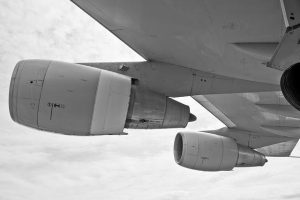
Firewalls aren’t limited to automobiles. While you can find them in cars, trucks and other automobiles, they are commonly used in airplanes as well. Firewalls are an important part of most airplanes. They act as barriers between an airplane’s engines and the rest of its airframe. For a better understanding of firewalls and why airplanes feature them, keep reading.
What Is a Firewall?
Also known as a bulkhead in the United Kingdom, a firewall is a fire-resistant barrier. It’s designed to separate the engines from the rest of the airframe. A firewall is literally a wall that protects against fires. They are commonly used in automobiles, buildings and, of course, airplanes.
If an engine experiences a catastrophic failure, it may ignite. The presence of a firewall will isolate the fire so that it doesn’t spread to the cabin or cockpit.
You can find firewalls in different materials, some of which include the following:
- Stainless steel
- Titanium
- Copper
- Terne plate (steel with a tin and lead alloy coating)
Why Airplanes Need Firewalls
Airplanes need firewalls for safety purposes. It protects them from fire damage associated with engine failure. Even if a fire occurs with one of an airplane’s engines, it won’t spread to the rest of the airplane’s airframe.
Most airplanes are powered by jet fuel. Jet fuel, of course, is highly combustible and burns at incredibly hot temperatures. When mixed with a sufficient amount of oxygen, jet fuel may burn at over 5,000 degrees Fahrenheit. That’s hot enough to melt airframes.
Firewalls don’t prevent fires from occurring. Engines can still experience catastrophic failure, and they can still ignite to create a fire. With that said, firewalls will protect essential parts of an airplane from damage in the event of a fire. Firewalls are made of fire-resistant materials. They can withstand extreme heat while isolating engine fires.
The U.S. Federal Aviation Administration (FAA) also requires firewalls in most airplanes. When inspecting new airplanes, the FAA will check for firewalls. Most airplanes are required to have a firewall around each engine. Without the appropriate firewalls, new airplanes may fail their inspection.
In Conclusion
Firewalls are physical barriers that separate an airplane’s engines from the rest of its airframe. They are made of heat-resistant materials, allowing them to isolate fires. If a fire breaks out, it will remain isolated to the failed engine. The fire shouldn’t be able to spread to the passenger cabin or cockpit.



